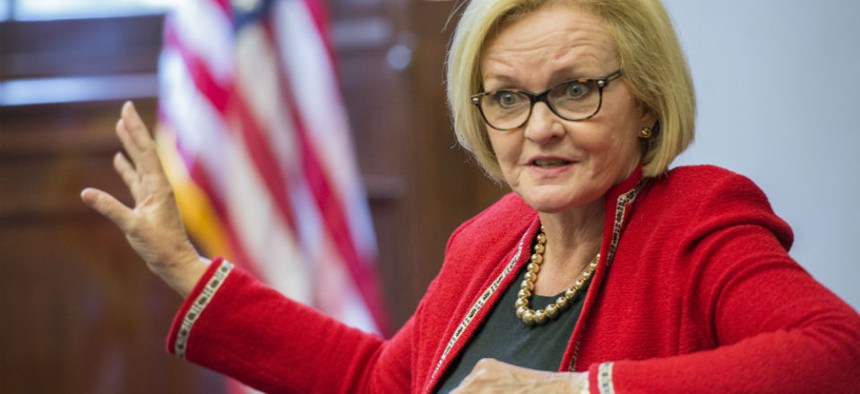
Sen. Claire McCaskill, D-Mo. (above), along with Sens. Kelly Ayotte, R-N.H., and Deb Fischer, R-Neb., reintroduced the Stop Wasteful Federal Bonuses Act on March 16. Office of Sen. Claire McCaskill file photo
Bill Would Ban Misbehaving Feds From Getting Bonuses
Bipartisan legislation also includes a provision requiring employees to repay bonuses received if they’ve done something wrong.
This story has been updated.
Federal employees who break the law or aren’t in good standing with their agency would be prohibited from receiving bonuses under a new bipartisan Senate bill.
The Stop Wasteful Federal Bonuses Act, reintroduced on Monday by Sens. Kelly Ayotte, R-N.H., Deb Fischer, R-Neb., and Claire McCaskill, D-Mo., would prohibit agency heads from awarding bonuses to employees who could be fired or suspended for violating agency policy, or for doing something illegal that could land them in prison for more than a year. The bonus ban for those employees would last for five years. Agency inspectors general, senior ethics officials or the Government Accountability Office would determine whether an employee’s conduct violated agency policy.
The bill also includes a mandatory clawback provision requiring the employee to repay -- after notice and an opportunity for a hearing -- the amount of any bonus made during the year in which such a determination is made.
“Federal employees who haven't paid their taxes or who face disciplinary problems should not be getting bonuses. This bipartisan legislation takes commonsense steps to prevent workers with serious conduct infractions from receiving bonus pay," said Ayotte.
Ayotte and McCaskill have introduced similar bills in the past.
On Wednesday, a House Oversight and Government Reform subcommittee planned to hold a hearing on tax delinquent federal employees and contractors. Federal employees owed $3.3 billion in taxes to Uncle Sam, as of Sept. 30, 2013, according to a May 22, 2014 news report in USA Today. That figure includes both executive and legislative branch employees. Still, the delinquency rate for federal employees is lower than for the general population.
The IRS currently doesn’t consider tax compliance or disciplinary actions when doling out bonuses or other awards, except for employees in the Senior Executive Service.
“If we're going to restore Americans' confidence that their federal government is spending money wisely, this legislation is a commonsense step in that direction,” McCaskill said. “Using taxpayer dollars to give cash bonuses to employees who've engaged in conduct that could get them fired or sent to jail is outrageous, and this bill would put an end to it.”
But agencies already can withhold bonuses from employees engaged in misconduct if they choose to, according to Cheri Cannon, a partner at Tully Rinckey, a federal sector labor and employment law firm in Washington. Cannon said the bill is another example of Congress drafting legislation to create laws in an area agencies already have discretion.
"Several agencies and programs within agencies of which I am aware, already do withhold bonuses from classes of employees, such as senior executives, if they have substantiated IG findings against them," said Cannon. "Mere suspicion or allegations of misconduct are not enough.”
Earlier this month, the House passed legislation that would give the secretary of Veterans Affairs the authority to order employees to repay bonuses. The idea behind the bill is to give the VA chief another tool to punish those engaged in misconduct -- in this instance by allowing the department to revoke bonuses those employees have received. But the legislation does not specify criteria that would be grounds for ordering a repayment, giving the secretary broad discretion. The bill also is aimed at clearing up any confusion over whether VA has the authority to claw back bonuses.







